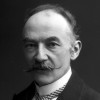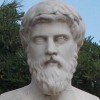This life is a hospital in which every patient is haunted by the desire to change beds. This one wants to suffer in front of the stove, and that one believes he will recover next to the window.
[Cette vie est un hôpital où chaque malade est possédé du désir de changer de lit. Celui-ci voudrait souffrir en face du poêle, et celui-là croit qu’il guérirait à côté de la fenêtre.]Charles Baudelaire (1821-1867) French poet, essayist, art critic
Le Spleen de Paris (Petits Poèmes en Prose), No. 48 “Any Where Out of the world” (1869) [tr. Kaplan (1989)]
(Source)
The title of the original is in English, a line from Thomas Hood, "The Bridge of Sighs." It is often subtitled with the French translation, "N’importe où hors du monde," which are the final lines.
(Source (French)). Alternate translations:
Life is a hospital, in which every patient is possessed by the desire of changing his bed. One would prefer to suffer near the fire, and another is certain that he would get well if he were by the window.
[tr. Symons (<1919)]
This life is a hospital where every patient is possessed with the desire to change beds; one man would like to suffer in front of the stove, and another believes that he would recover his health beside the window.
[tr. Hamburger (1946)]
Life is a hospital where every patient is obsessed by the desire of changing beds. One would like to suffer opposite the stove, another is sure he would get well beside the window.
[tr. Varèse (1970)]
This life is a hospital where each patient is possessed with the desire of changing his bed. One would like to suffer in front of the stove, and another believes he would get well beside the windows.
[tr. Fowlie (1992)]
This life is a hospital, where each patient is possessed by the desire to change beds. That one prefers to suffer nearer the stove and this one believes he would get well next to the window.
[tr. Waldrop (2009)]
Quotations about:
circumstance
Note not all quotations have been tagged, so Search may find additional quotes on this topic.
Yes; quaint and curious war is!
You shoot a fellow down
You’d treat if met where any bar is,
Or help to half-a-crown.
Now and then it occurs to one to reflect upon what slender threads of accident depend the most important circumstances of his life; to look back and shudder, realizing how close to the edge of nothingness his being has come.
Upton Sinclair (1878-1968) American writer, journalist, activist, politician
100%: the Story of a Patriot, Sec. 1 (1920)
(Source)
If life becomes hard to bear we think of a change in our circumstances. But the most important and effective change, a change in our own attitude, hardly even occurs to us, and the resolution to take such a step is very difficult for us.
Ludwig Wittgenstein (1889-1951) Austrian-English philosopher
Culture and Value, 1946 (1977) [tr. Winch (1980)]
(Source)
For we hold that the man who is truly good and wise will bear with dignity whatever fortune sends, and will always make the best of his circumstances, as a good general will turn the forces at his command to the best account, and a good shoemaker will make the best shoe that can be made out of a given piece of leather, and so on with all other crafts.
[τὸν γὰρ ὡς ἀληθῶς ἀγαθὸν καὶ ἔμφρονα πάσας οἰόμεθα τὰς τύχας εὐσχημόνως φέρειν καὶ ἐκ τῶν ὑπαρχόντων ἀεὶ τὰ κάλλιστα πράττειν, καθάπερ καὶ στρατηγὸν ἀγαθὸν τῷ παρόντι στρατοπέδῳ χρῆσθαι πολεμικώτατα καὶ σκυτοτόμον ἐκ τῶν δοθέντων σκυτῶν κάλλιστον ὑπόδημα ποιεῖν: τὸν αὐτὸν δὲ τρόπον καὶ τοὺς ἄλλους τεχνίτας ἅπαντας.]
Aristotle (384-322 BC) Greek philosopher
Nicomachean Ethics [Ἠθικὰ Νικομάχεια], Book 1, ch. 10, sec. 13 (1.10.13) / 1101a.1-6 (c. 325 BC) [tr. Peters (1893)]
(Source)
(Source (Greek)). Alternate translations:
For the man who is truly good and sensible bears all fortunes, we presume, becomingly, and always does what is noblest under the circumstances, just as a good general employs to the best advantage the force he has with him; or a good shoemaker makes the handsomest shoe he can out of the leather which has been given him; and all other good artisans likewise.
[tr. Chase (1847), ch. 8]
For we hold that the really good and prudent man will bear all changes of fortune with good grace, and will always, as the case may allow, act most nobly; exactly as a good general will use such forces as are at his disposal most skilfully, and even as a good cobbler will, out of such leather as he may have, make the most perfect show; and of all those who practice any other art the same rule will hold good.
[tr. Williams (1869), sec. 17]
For our conception of the truly good and sensible man is that he bears all the chances of life with decorum and always does what is noblest in the circumstances, as a good general uses the forces at his command to the best advantage in war, a good cobbler makes the best shoe with the leather that is given him, and so on through the whole series of the arts.
[tr. Welldon (1892)]
For the man who is truly good and wise, we think, bears all the chances life becomingly and always makes the best of circumstances, as a good general makes the best military use of the army at his command and a good shoemaker makes the best shoes out of the hides that are given him; and so with all other craftsmen.
[tr. Ross (1908)]
We hold that the truly good and wise man will bear all kinds of fortune in a seemly way, and will always act in the noblest manner that the circumstances allow; even as a good general makes the most effective use of the forces at his disposal, and a good shoemaker makes the finest shoe possible out of the leather supplied him, and so on with all the other crafts and professions.
[tr. Rackham (1934)]
For a truly good and practically-wise person, we think, will bear what luck brings graciously, and, making use of the resources at hand, will always do the noblest actions, just as a good general makes the best uses in warfare of the army he has and a good shoemaker makes the best shoes out of the hides he has been given, and the same with all other craftsmen.
[tr. Reeve (1948)]
For we hold that a truly good and sensible man will bear all fortunes of life with propriety and will always act most nobly under whatever the given circumstances may be, like a good general, who uses a given army most effectively, or a good shoemaker, who makes the best shoes out of a given leather, and likewise with any artist.
[tr. Apostle (1975)]
For we believe that the truly good and wise man bears all his fortunes with dignity, and always takes the most honorable course that circumstances permit, just as a good general uses his available forces in the most militarily effective way, and a good shoemaker makes the neatest shoe out of the leather supplied to him, and the same with all the other kinds of craftsmen.
[tr. Thomson/Tredennick (1976)]
For a truly good and intelligent person, we suppose, will bear strokes of fortune suitably, and from his resources at any time will do the finest action, just as a good general will make best use of his forces in war, and a good shoemaker will produce the finest shoe from the hides given him, and similarly for all other craftsmen.
[tr. Irwin/Fine (1995)]
For the truly good and wise person, we believe, bears all the fortunes of life with dignity and always does the noblest thing in the circumstances, as a good general does the most strategically appropriate thing with the army at his disposal, and a shoemaker makes the noblest shoe out of the leather he is given, and so on with other practitioners of skills.
[tr. Crisp (2000)]
For we suppose that someone who is truly good and sensible bears up under all fortunes in a becoming way and always does what is noblest given the circumstances, just as a good general makes use, with the greatest military skill, of the army he has and a shoemaker makes the most beautiful shoe out of the leather given him. It holds in the same manner with all the other experts as well.
[tr. Bartlett/Collins (2011)]
The poverty of goods is easily cured; the poverty of the soul is irreparable.
Michel de Montaigne (1533-1592) French essayist
Essays, Book 3, ch. 10 “Of Managing the Will” (1588) [tr. Cotton (1877)]
(Source)
Alt. trans.: "Poverty of possessions may easily be cured, but poverty of soul never."
Convinced that character is all and circumstances nothing, [the Puritan] sees in the poverty of those who fall by the way, not a misfortune to be pitied and relieved, but a moral failing to be condemned, and in riches, not an object of suspicion but the blessing which rewards the triumph of energy and will.
R. H. Tawney (1880-1962) English writer, economist, historian, social critic [Richard Henry Tawney]
Religion and the Rise of Capitalism, ch. 4 (1926)
(Source)
MALVOLIO: In my stars I am above thee, but be not afraid of greatness. Some are born great, some achieve greatness, and some have greatness thrust upon ’em.
William Shakespeare (1564-1616) English dramatist and poet
Twelfth Night, Act 2, Sc. 5, l. 147ff (2.5.147-150) (1601)
(Source)
The phrase appears three times in the play:
See also Boorstin.
- As above, Malvolio reading the forged love letter from Maria.
- Act 3, sc. 4, l. 42ff, Malvolio recalling the phrases from the letter.
- Act 5, sc. 1, l. 393ff, the Fool reciting the second half of the phrase.
The convictions that leaders have formed before reaching high office are the intellectual capital they will consume as long as they continue in office. There is little time for leaders to reflect. They are locked in an endless battle in which the urgent constantly gains on the important. The public life of every political figure is a continual struggle to rescue an element of choice from the pressure of circumstance.
Vows made in Storms are forgot in Calms.
Thomas Fuller (1654-1734) English physician, preacher, aphorist, writer
Gnomologia: Adages and Proverbs, #5408 (1732)
(Source)
The depth and strength of a human character are defined by its moral reserves. People reveal themselves completely only when they are thrown out of the customary conditions of their life, for only then do they have to fall back on their reserves.
Leon Trotsky (1879-1940) Russian politician, Marxist, intellectual, revolutionary [b. Lev Davidovich Bronstein]
Diary in Exile, 1935-04-05 (1958)
(Source)
What a Day may bring a Day may take away.
Thomas Fuller (1654-1734) English physician, preacher, aphorist, writer
Gnomologia: Adages and Proverbs, #5475 (1732)
(Source)
Poverty, sir, is no disgrace to a man, but it is confoundedly inconvenient.
Sydney Smith (1771-1845) English clergyman, essayist, wit
(Attributed)
Shallow men believe in luck, believe in circumstances — it was somebody’s name, or he happened to be there at the time, or it was so then, and another day would have been otherwise. Strong men believe in cause and effect.
Ralph Waldo Emerson (1803-1882) American essayist, lecturer, poet
“Worship,” The Conduct of Life, ch. 6 (1860)
(Source)
Every body and every thing conspire to make me as contented as possible in it; yet I have seen too much of the vanity of human affairs, to expect felicity from the splendid scenes of public life. I am still determined to be cheerful and to be happy, in whatever situation I may be; for I have also learnt, from experience, that the greater part of our happiness or misery depends upon our dispositions, and not upon our circumstances. We carry the seeds of the one or the other about with us, in our minds, wheresoever we go.
Martha Washington (1731-1802) American socialite, wife of George Washington, First Lady (1789-1797)
Letter to Mercy Otis Warren (1789-12-26)
(Source)


















